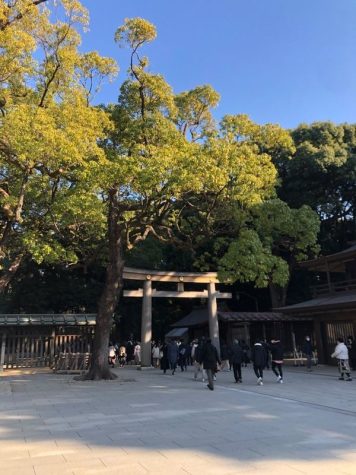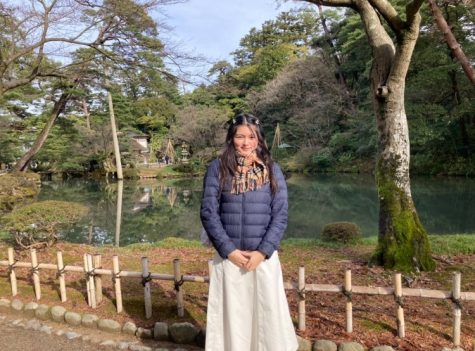Aruna Venkateswaran
December 9, 2022
The charcoal smell of grilled chicken roasting in the small, well-preserved town of Kanazawa transports sophomore Aruna Venkateswaran back to her maternal grandparents’ home in Japan, which she visited in 2019. Although the chicken, or yakitori, is a staple delicacy she enjoys every time she visits, her favorite part of the experience is the end of each meal, when the restaurant she frequents provides her with delicious soft serve for free. Venkateswaran fondly recalls holding her frozen treat in one hand while using her other hand to spin a multi-colored wheel to win a prize.
“[In America] everything is fast paced,” Venkateswaran said. “You’re either going to classes all the time, or you’re going to school. But in Japan, it’s just peaceful and you just get to do things that you like. [When I go], I feel kind of lost, but then I also feel really excited.”

Although Venkateswaran’s maternal grandparents live over 5,000 miles from her, she is able to keep in touch with them via the communication app Line. A highlight of her day is receiving over 20 notifications per day from a group chat with her mom, grandparents and uncle. While they do talk about familial updates, Venkateswaran claims that more often than not, her grandparents use the chat to communicate among themselves about mundane things such as purchasing groceries, because they’re still unclear on how to use the app properly.
Although Venkateswaran is enrolled in Japanese classes at MVHS, she sometimes faces difficulties understanding the messages because all of the texts are sent in the Japanese written language called Kanji.
“I like to think of [our group chat] as good Japanese practice because I’m not completely fluent,” Venkateswaran said. “My grandparents know all the kanji, so when they type in really hard kanji [that] I don’t know, I go to Google Translate and instead of using the Translate feature — which is not that helpful — I actually see how you say it, and then if I know what it sounds like, I know the meaning. That’s how I learn what word attaches to what kind of character.”
Venkateswaran also has grandparents on her paternal side in India who she talks to through WhatsApp multiple times per week.
“My grandmother [from India] and I share a strong connection, just because we talk to each other really often, especially through the phone,” Venkateswaran said. “We don’t text, [but sometimes] she sends me motivational photos like ‘today is going to be amazing’ and I just say ‘thanks!’”
Venkateswaran views her paternal grandmother as a strong role model in her life and says she has taught her many important life lessons. One of the main ways in which Venkateswaran preserves the strong relationship with her grandmother is by participating in a classical Indian dance called Bharatanatyam. Since the age of seven, Venkateswaran has been dancing in an attempt to connect with her cultural roots.

“My grandmother was a dancer so she gives me her books and I send her my music,” Venkateswaran said. “She’s never seen me perform, but one time when we were doing our calls, I danced for her and it made her really happy. [My grandparents] won’t be able to come [to America], but at least when I do my solo dance for Bharatanatyam, I’ll be able to livestream it and she’ll be able to watch it and enjoy it.”
Despite the distance, Venkateswaran hopes to visit her family in both India and Japan sometime by the end of 2022.
“[My favorite memory in Japan was when] we went to go see fireworks at a nearby resort,” Venkateswaran said. “My dad can’t speak Japanese, but he tries his best. He knows a little bit [of Japanese] but it’s sort of funny to see my dad and my grandparents [interact] because they just smile and nod at each other and try to communicate the best they can. Watching them makes me laugh and it also makes me happy to see my family get along.”
